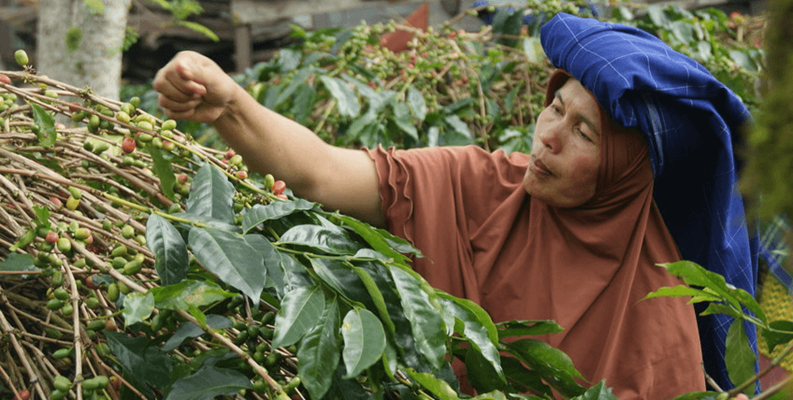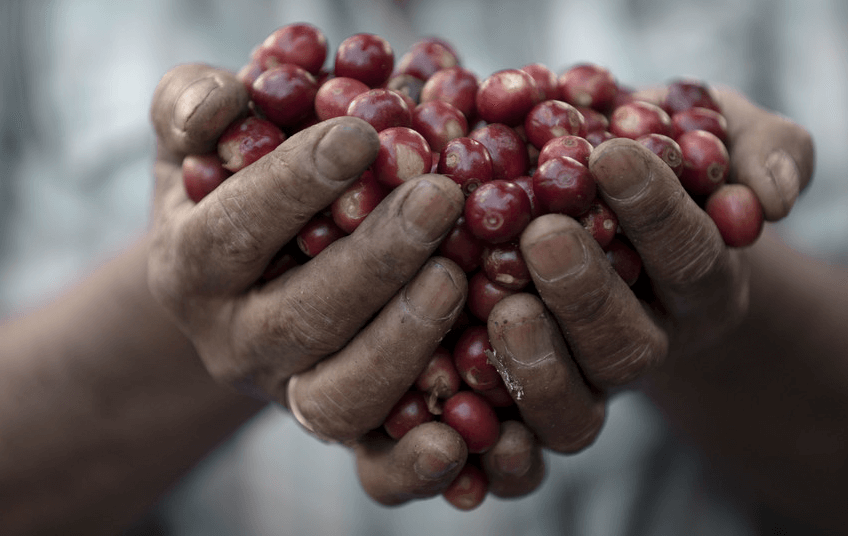by Hannah Radvan
Farmers and workers in the global south are often living on thin margins even during ‘normal’ times.
Though coffee is one of the most traded commodities in the world, millions of farmers still struggle to earn a decent income, which in some origins is resulting in abandonment of the profession by younger generations in search of better-paid work elsewhere. The COVID-19 pandemic is yet another challenge added to coffee farmers’ long list of ongoing battles against the rising threat of crop disease, weather shocks resulting from climate change and price fluctuations, to name just a few. (You can read more about the effects of the climate crisis on farmers here.)
Global coffee prices are highly volatile right now, due to uncertainty in the commodities markets caused by the COVID-19 pandemic. World market prices remain at low levels, hovering at around just $1.20 per pound, despite having risen over the past year. Whilst at home consumption is on the rise, demand for speciality coffee is likely to be affected due to social distancing measures which have seen cafes and restaurants across the globe close thus diminishing out-of-home coffee consumption, which may cause further volatility in prices.
The immediate vulnerability of farmers to economic damage depends on variables such as the timing of the harvest season which differs around the world. In Latin America, for instance, around 60% of the harvest is yet to be picked meaning lockdowns and social distancing could spell disaster for farmers’ yields. Whether on harvesting, milling or transport of coffee, movement restrictions are likely to have a negative impact in some way or another for the majority of coffee producers. In several high-volume producing regions, there are increasing reports of restrictions on the transport and export of goods, including reported shortages in packaging, transport drivers, market and auction closures, and shipping and freight delays caused by port restrictions, border closures and lockdowns. For coffee farmers, this could mean a reduction in a vital source of income, putting the livelihood, food security and wellbeing of coffee farming communities at risk.
On top of struggling with their businesses and income generation, COVID-19 represents a considerable high health risk to many coffee growing communities, where the majority of farmers live in remote areas with limited access to health care facilities.
Fairtrade safety net more important than ever
In this period of unprecedented uncertainty, where implications of COVID-19 are exacerbating the already precarious situations for many coffee farmers, the benefits of Fairtrade are more vital now than ever. The Fairtrade Minimum Price is a safety net for Fairtrade coffee producers during this time, ensuring they receive a guaranteed price of US$1.40 per pound for Arabica, and an additional 30 cents per pound for organic coffee. On top of this, co-operatives receive the Fairtrade Premium of 20 cents per pound. This Premium is an extra sum of money to invest in projects of their choice which benefit their businesses and communities. In 2018, Fairtrade coffee co-operatives earned 76,605,525 Euros, which was spent on initiatives ranging from building schools to reforestation projects.
Since the outbreak, Fairtrade is continuing to actively contact producer organisations to respond to their needs quickly and effectively. One such measure, has been Fairtrade International’s announcement to allow producer organisations to spend Fairtrade Premium funds more flexibly during the pandemic, for instance, to pay out as emergency cash payments, purchase face masks or other PPE, or implement hygiene campaigns. Producer groups can also make faster decisions on spending Premium on the COVID-19 response, and take action without waiting for approval at their required annual General Assembly meetings and will instead document expenditures for retroactive ratification.
Fairtrade Together: Funding COVID-19 interventions with Fairtrade Premium
There have already been numerous examples of Fairtrade coffee producer organisations demonstrating solidarity during this precarious time and coming together to spend Premium on supporting their local communities.
Following the announcement of lockdown in Peru, the government arranged to provide subsidies to support the population with the most limited resources, yet it has not been possible to reach the entire population. To support government efforts, the Amazonas Alto Mayo Producers Association (APROMAYO) and the Cooperativa de Servicios Múltiples (ADISA), both Fairtrade coffee producers located in the department of San Martín, took the initiative to use some of their Premium to purchase provisions for food supply kits to distribute among the vulnerable members of the community. For the elderly, people with limited mobility, or those facing food insecurity, this support from the co-ops is a lifeline. It’s another way that Fairtrade certified producers in Peru, and across the globe, are making a big difference during this time. Similarly, Bukonzo Organic Farmers’ Cooperative Union Limited in Uganda has stepped in to support government with aid to the vulnerable by using Fairtrade Premium to purchase and distribute essential items.
In Brazil, members of the Cooperativa dos Cafeicultores do Sul do Estado do Espírito Santo (CAFESUL) have spent some of their Premium on essential supplies for a local care home, and donated ground coffee. Highlighting the Fairtrade community spirit, Renato Theodoro, president of CAFESUL, said: ‘The Health Ministry is very concerned about the elderly…[we] are part of Fairtrade, a commercial model that promotes an economic production that is socially and environmentally sustainable – and we receive a Premium for following those Standards…our board of directors met and decided to use part of the Premium for social actions in the communities we work in.’ In addition to this donation, the co-op distributed kits to their members containing cleaning products, protective masks made by CAFESUL women’s group, and a manual prepared by the Secretary of Agriculture with prevention recommendations during this year’s coffee harvest.

These acts of solidarity amongst Fairtrade co-operatives are by no means isolated instances, and are a testament to the Fairtrade community spirit, which is more apparent than ever in the current face of adversity.
Keep Apart, Stay United
This global pandemic has highlighted more than ever that we are all connected, not just in our towns and cities but also across the world. Just as new viruses like COVID-19 crisscross the globe, so do supply chains. Many farmers and agricultural workers are going to work each day to keep the world’s food supply intact. By supporting Fairtrade coffee farmers and workers during these times, and continuing to buy from Fairtrade co-operatives, we support them to protect the health and safety of their communities, to weather the economic challenges ahead, and to stand together in global solidarity.
‘We, producers, ask you to keep consuming Fairtrade products because the Premium that we get when you buy our products is being used for different social actions that contribute to minimising the effects of this pandemic,’ Renato Theodoro, president of CAFESUL co-operative.
